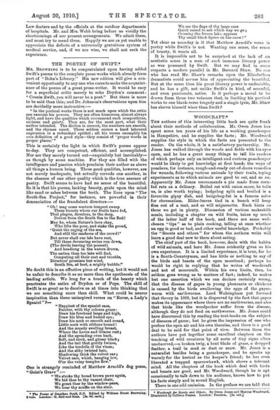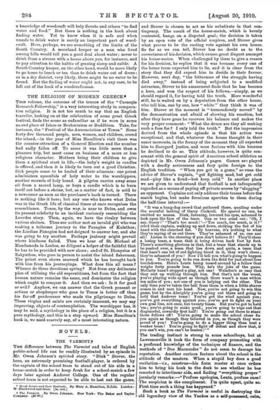WOODCRAFT.*
THE authors of this interesting little book are quite frank about their methods of collaboration. Mr. Owen Jones has spent some ten years of his life as a working gamekeeper in Hampshire, and he supplies the facts ; Mr. Woodward supplies the style in which the facts are presented to the reader. On the whole, it is a satisfactory partnership. Mr. Jones has walked through the woods and fields with his eyes open, and he has a great many things to tell his readers of which perhaps only an intelligent and curious gamekeeper would be likely to get knowledge at first hand; the ways of poachers, for instance, rough-and-ready out-of-doors remedies for wounds, following various animals by their trails, trying experiments as to which animals are good to eat, and so on. Apparently Mr. Jones recommends a pie made from corn- fed rats as a delicacy. Boiled rat with onion sauce, he tells us, is also worth trying ; hedgehog split and broiled is a favourite gipsy dish, and hedgehog-fat is a famous salve for rheumatism. Elder-leaves tied in a bunch will keep flies out of a tent, and so will mignonette. Such hints as these we get in plenty. Discussion of various makeshift meals, including a chapter on wild fruits, takes up much of the latter half of the book, and there are some well- chosen " tips " as to plain cooking, telling at once whether an egg is good or bad, and other useful knowledge. Probably the "Scouts and others" for whom the authors write will learn a good deal new to them about eating.
The chief part of the book, however, deals with the habits of wild animals, and here Mr. Jones evidently gives us his own experience. It is a limited experience, it is true, for he is a South-Countryman, and has little or nothing to say of the birds and beasts of the open moorland ; perhaps he would be right in replying that be writes of woodcraft and not of moorcraft. Within his own limits, then, ho seldom goes wrong as to matters of fact; indeed, he makes but one assertion which we can declare certainly wrong, that the disease of gapes in young pheasants or chickens is caused by the birds swallowing the eggs of the gapes- worm with earthworms. Lord Walsingham put forward that theory in 1888, but it is disproved by the fact that gapes makes its appearance where there are no earthworms, and also that birds like the woodpecker suffer from the disease, although they do not feed on earthworms. Mr. Jones could have discovered this by reading the text-books on the subject of diseases of game ; but he gives the impression of one who prefers the open air and his own theories, and there is a good deal to be said for that point of view. Between them the authors have put together some excellent chapters on the tracking of wild creatures' by all sorts of tiny signs often unobserved,—a broken twig, a bent blade of grass, a dropped feather, a trail in mud or dust or snow. Mr. Jones is a naturalist besides being a gamekeeper, and he speaks up warmly for the kestrel as the keeper's friend; he has even liberated a trapped sparrowbawk, which shows a tolerant mind. All the chapters of the book which deal with birds and beasts are good, and Mr. Woodward, though he is apt occasionally to talk down to his audience, knows how to put his facts simply and in sound English. There is one odd omission. In the preface we are told that • Woodcraft for Scouts and Others. By Owen Jones and Ibsen' Woodward. Illustrated by Colbron Pearce. London : Pearson. [28. net.]
a knowledge of woodcraft will help Scouts and others "to find water and food." But there is nothing in the book about finding water. Yet to know when it is safe and when unsafe to drink water is surely an important part of wood- craft. Here, perhaps, we see something of the limits of the South Country. A moorland keeper or a man who lived among hills would tell you a good deal about water ; never to drink from a stream with a house above you, for instance, and to pay attention to the habits of grazing sheep and cattle. A South Country keeper, on the other hand, would be more likely to go home to lunch or tea than to drink water out of doors ; or in a dry district, very likely, there might be no water to be found. But the finding of water ought not, in any case, to be left out of the book of a woodcraftsman.







































 Previous page
Previous page